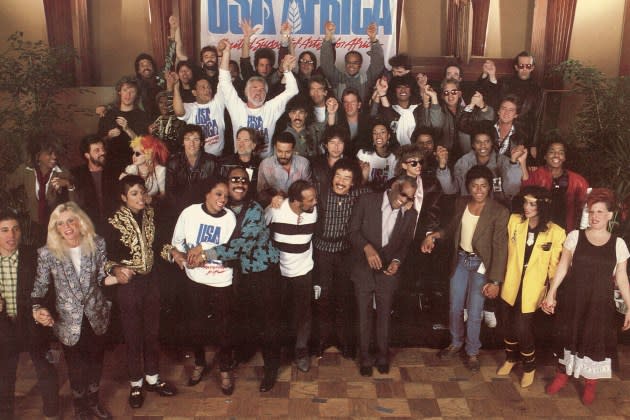Sheila E.: ‘We Are the World’ Producers Used Me To Try To Get Prince
- Oops!Something went wrong.Please try again later.
- Oops!Something went wrong.Please try again later.

The sessions started at Hollywood, California’s A&M Studios the night of Jan. 28, 1985, and didn’t end until well after sunrise the morning of Jan. 29. By that point, it was clear that nothing quite like “We Are the World” could ever happen again. The Greatest Night in Pop, a new documentary on Netflix, brings it all back to vivid life: co-writers Michael Jackson and Lionel Richie joined by Stevie Wonder, Tina Turner, Ray Charles, Bob Dylan, Bruce Springsteen, and an improbably long list of other superstars, all crammed in to one room to record the most overstuffed posse cut in the history of humankind, with Quincy Jones producing.
With the release of the new documentary — and the 39th anniversary of the recording session — we took our own look back at the epochal mega-collab on the new episode of Rolling Stone Music Now, talking to Bao Nguyen, the documentary’s director; longtime Quincy Jones associate Tom Bahler, who arranged the vocals for “We Are the World”; and one of the night’s singers, Sheila E. Some highlights follow; to hear the full episode, go here for the podcast provider of your choice, listen on Apple Podcasts or Spotify, or just press play above.
More from Rolling Stone
Karol G Was 'So, So Good' in 'Griselda' That They Wrote Her More Lines
Bruce Springsteen, Shania Twain, Jelly Roll Slated for Gala Honoring Jon Bon Jovi
Zach Bryan's Rise Was Just the Beginning of Country's 2023 Triumphs
Sheila E. felt tricked by the song’s producers. In the podcast, she expands on revelations from the documentary, in which she explains that she felt deceived by promises of a solo vocal part that never arrived. Instead, the producers kept pushing her to call Prince, her close collaborator at the time, and get him to come down to the session — which of, course, he never did. “Lionel and Quincy kept saying, ‘Why don’t you call Prince,'” she tells Rolling Stone Music Now. “Everyone took turns trying to get me to call him back and have him come down…. I just thought, wow, they were all my friends. That’s cold-blooded.” (Lionel Richie, one of the producers of the new documentary, didn’t dispute Sheila E.’s account, according to Nguyen.)
Bruce Springsteen talked for the documentary after Lionel Richie personally reached out to him. “In a way life was imitating art,” says Nguyen, “because [the original song] took all these artists to call each other up to tell them, like, ‘This is gonna be a hit.'”
When it came to choosing parts for the many singers, Quincy Jones left the choices mostly up to arranger Tom Bahler, but he did have a few definitive ideas of his own. “‘I have two requests,'” Bahler recalls Jones telling him. “‘One is, Lionel was the first one to write this, to begin it, so he should be the first voice we hear. Then, because Michael came in and they finished it together, Michael should sing the first chorus.’ And then, this is his humor, he said, ‘And I think you should bring Diana in for the second half of the first chorus, because some people think they’re the same person.'”
Much of the behind-the-scenes footage of the session had no audio — but the filmmakers were able to painstakingly restore the sound after they learned that Life magazine reporter David Breslin had kept his own lo-fi recordings of it all. “Our archive producer was like, ‘Oh, let me just reach out to this Life magazine journalist and see what he’s got,” says Nguyen. “He’s like, ‘Oh yeah, I’ve got hours and hours of my dictaphone.’ And so we got lucky.”
Viral TikToks that suggest Michael Jackson was unhappy with Huey Lewis’ performance aren’t accurate. As the documentary explains in great detail, Lewis didn’t get his solo in the song until well into the recording session, when it became clear that Prince — who the producers hoped would take the part — was never going to show up. If anything, Jackson’s stoic expression during that part of the session was just reflecting his own shyness, and everyone’s stress over the sudden switch.
Download and subscribe to Rolling Stone‘s weekly podcast, Rolling Stone Music Now, hosted by Brian Hiatt, on Apple Podcasts or Spotify (or wherever you get your podcasts). Check out six years’ worth of episodes in the archive, including in-depth, career-spanning interviews with Bruce Springsteen, Mariah Carey, Halsey, Neil Young, Snoop Dogg, Brandi Carlile, Phoebe Bridgers, Rick Ross, Alicia Keys, the National, Ice Cube, Taylor Hawkins, Willow, Keith Richards, Robert Plant, Dua Lipa, Questlove, Killer Mike, Julian Casablancas, Sheryl Crow, Johnny Marr, Scott Weiland, Liam Gallagher, Alice Cooper, Fleetwood Mac, Elvis Costello, John Legend, Donald Fagen, Charlie Puth, Phil Collins, Justin Townes Earle, Stephen Malkmus, Sebastian Bach, Tom Petty, Eddie Van Halen, Kelly Clarkson, Pete Townshend, Bob Seger, the Zombies, and Gary Clark Jr. And look for dozens of episodes featuring genre-spanning discussions, debates, and explainers with Rolling Stone’s critics and reporters
Best of Rolling Stone
